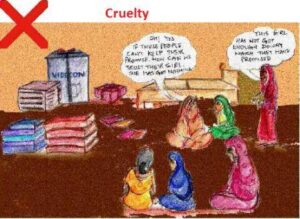
Dowry Harassment Against Women even in the 20th Century.

History
Women in Indian society have been subjected to increasingly grave human rights violations, especially in the past few decades. The role of women in the male-dominated patriarchal structure of our society, the dowry system, the economic dependency of women, a lack of education, and poverty are a few factors contributing to the increasing rate of violence against them. Women are still subjected to being puppets in the hands of husbands.
Introduction
Dowry, one of the most harmful customs in India, is seen as a sign of social prestige. Just like every piece of clothing in a boutique has a price tag, so does this. Similarly, this practice had become synonymous with the context “groom on sale”, with even bigger and bolder price tags.
As society is changing, many things around us are changing as well. But the evil practices in society against women are not reducing even in the 20th century. even though various kinds of statutes, orders, and rules have been implemented. Under the shadow of various social institutions, crimes against women are happening in different ways. One of the most concerning institutions is marriage.
Is marriage becoming a problem for the father of the bride? Are they things to buy under the shadow of marriage? Dowry, which is interlinked with various crimes against women, starts with the birth of the girl child and ends with her death.
Legislative Provisions
Legislation has introduced various laws that are useful for the protection of women against crime. Some of them are the Dowry Prohibition Act, Sections 304B and 498A of the Indian Penal Code, and Section 113 of the Indian Evidence Act.
And there are a lot of provisions for the betterment of women in society, such as fundamental rights that give equal opportunities and prohibit discrimination based on caste, religion, sex, race, and creed; and also, some of the evil practices like sati, child marriage, female foeticide, infanticide, etc. They also become invisible in society, except for dowry.
The practice of dowry under the shadow of marriage
Section 498 A of the Indian Penal Code clearly mentions that demanding and giving dowry are punishable offences under the Indian Penal Code. Despite the strong statutes, people are still breaking them. Every bride and groom’s family is thinking about the profits they will earn from marriage. Thus, it became a business instead of a moral ceremony.
Conclusion
In 2020, dowry-related issues claimed the lives of 19 women every day. Every year, there were roughly 6,966 incidents of dowry deaths documented, with 7,045 victims. Nowadays, there are an uncountable number of crimes against women. The poll results demonstrate the extent of female brutality and harassment.
In every marriage, irrespective of economic status, the practice of dowry is carried out; it is ingrained in the culture of all religions. Thus, beliefs, thinking, and customs have to change for the elimination of dowry and its related issues. It will be possible only when women stand up for their rights in society.







